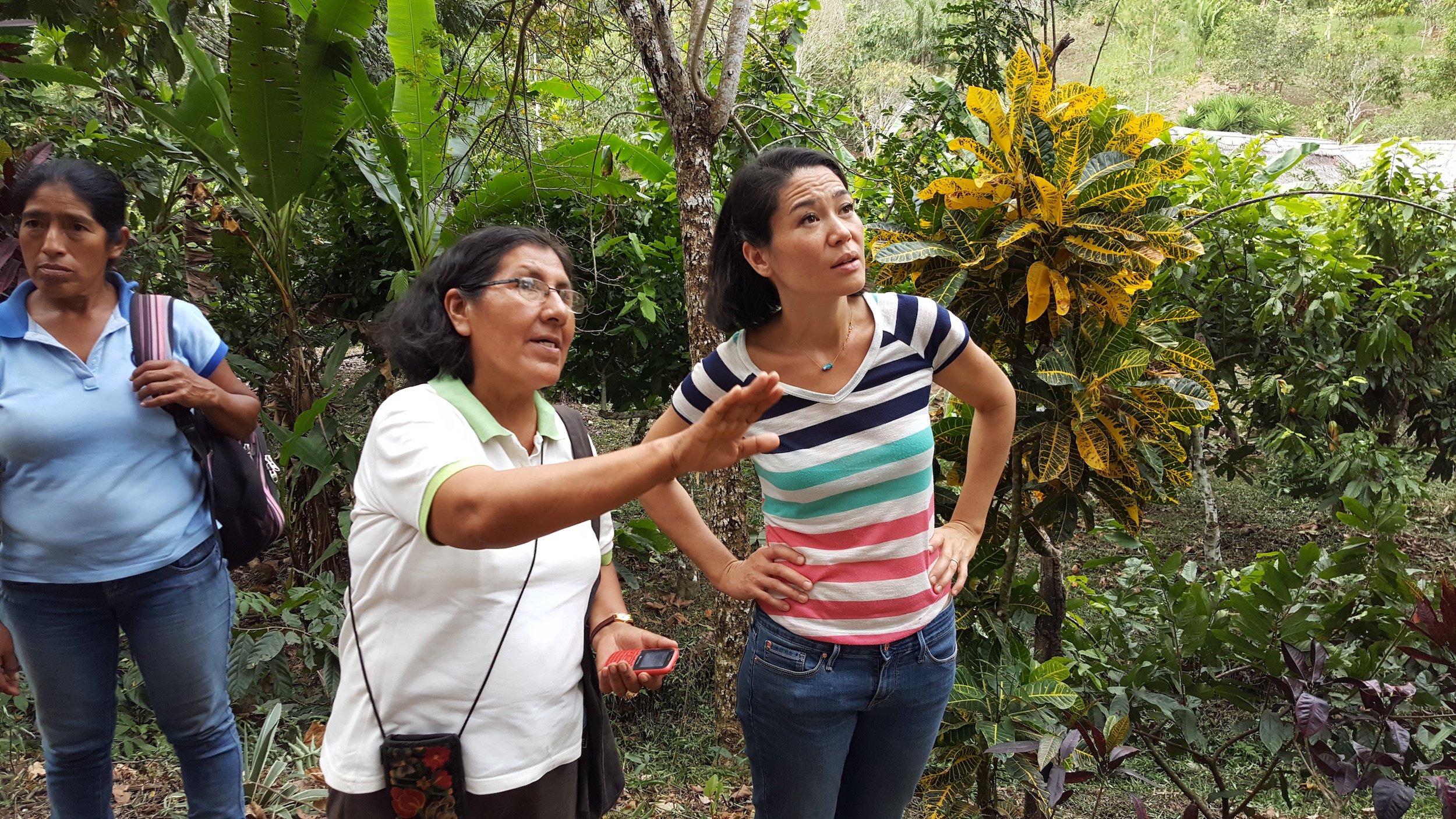How Collaboration Fuels Operations at Atlanta-Based Xocolatl Small Batch Chocolate
Elaine learning from farmer partners photo credit Xocolatl
Elaine Read and Matt Weyandt cofounded Xocolatl Small Batch Chocolate in Atlanta, during 2014. But their route to full-time chocolate-making was circuitous. Eager to unplug from modern life, the couple had moved to Costa Rica a couple of years earlier with two young children and no timetable. Little did they know they would also find their life’s passion in the Central American country.
“We happily discovered cacao while we were down there,” Read says. “There was a local farmer’s market with all sorts of small batch food producers and a couple of chocolate makers. As we got to know them, we learned they were making chocolate from cacao that grew in that area, and how bean-to-bar dark chocolate was being made.
“Matt and I discovered we liked their chocolate so much better than what we grew up with. And we were fortunate that two local chocolate makers were very generous in teaching us the ropes of developing a roast flavor profile and learning about drying times.”
Making Chocolate Transparently, in Atlanta
Elaine and Matt meeting with the cooperative photo credit Xocolatl
When the couple returned to Atlanta, they focused on refining their technique for crafting bean-to-bar chocolate and growing their new business, while cultivating relationships with cacao farmers. Xocolatl sources cacao that reflects healthy forests and sustainable, slave-free farming practices.
“We want to have transparency in our operations and know exactly what the farmers are being paid,” Read says. “We were sourcing cacao directly from Costa Rica until about two years ago, in partnership with another craft chocolate maker, French Broad. “We switched over to cacao grown in Uganda, which has a similar flavor profile, through Latitude Craft Chocolate.
Matt sniffing cacao beans photo credit Xocolatl
“We also like the way they support farmers they work with, and women run most of the farms. We source our beans from Latitude plus a farmer in Nicaragua, and a Peru farmer collective.”
In some cases, Read and Weyandt pay rates that providers determine. They also listen to farmers and farmer cooperatives regarding pricing. Sometimes the couple also pays a quality premium per ton of cacao on top of Fair Trade and organic certification pricing.
Xocolatl Bars
Xocolatl packaging photo credit Lisa Waterman Gray
From rich, complex Matagalpa Nicaraguan 72% and San Martin de Pangoa Peruvian 70% cacao to flavored options, Xocolatl’s vegan, plant-based, non-dairy chocolate bars are beautifully crafted big sellers. After other ingredients merge with unflavored chocolate, flavored bars average 50 to 60 percent cacao.
The customer favorite bar, Kissed Mermaids, features subtle coconut milk flavor, vanilla-infused sea salt and delightful crunch from highly visible nibs. Xocolatl’s Love & Happiness bar incorporates lush raspberry plus citrus tang, while Crackle & Crunch combines rich creamy mouthfeel and quinoa crunchiness. The company sells roasted cacao nibs, and chocolate hazelnut spread, too, with an ongoing line of bonbons in the works.
Additional customer favorites include trail mix with broken chocolate pieces and Nicaraguan drinking chocolate made from ground chocolate. “It’s not the same as hot cocoa,” Read says.
“[By making items beyond bars] we minimize any waste created in the process of making chocolate. For instance, tempering might not have gone right or there may be blemishes on the bar and we convert that into a product for which appearance won’t matter.”
Xocolatl bar pattern photo credit Lisa Waterman Gray
Xocolatl’s Impressive Sustainability Efforts
It’s only one small step in reducing Xocolatl’s environmental impact. “Our goal is to be a carbon-neutral company,” Read says. “Our bars are already being produced with a zero carbon footprint. We want to extend this to all aspects of our company through our investments, carbon capture and carbon credits – including all our shipping.”
Since May 2022 Xocolatl has composted nearly 4,000 pounds of cacao husks, food waste, and paper products in cooperation with Compost Now. Last year the company also purchased carbon credits that protect Indonesian rainforest and orangutan habitat, plus carbon credits that assist with Brazilian rainforest protection. In addition, Xocolatl purchases carbon credits for every online order, while supporting communities in Chile and Malawi (where Read was a Peace Corps volunteer).
Collaboration Wins
Setting The Bar: A Craft Chocolate Origin Story
Collaboration with other craft chocolate-makers has been another important aspect of the couple’s business model. “As a small craft chocolate maker, we’re not buying one container of cacao, ourselves, at any one time,” Read says.
That collaboration hit a high point during 2019, when Xocolatl and three additional companies participated in a documentary called Setting The Bar: A Craft Chocolate Origin Story. “We’ve had very good luck partnering with the other makers in that film,” Read says. “We were already making that trip together when the documentarian contacted us.” Xocolatl has come a long way since 2014. From an initial 400-square-foot production and retail space, the company moved into a larger facility about a year ago. Now, there’s plenty of space to offer customer factory tours, and tasting experiences.
If Read and Weyandt have a motto, it’s what they say on their website, “We’re going to keep building a chocolate company that makes as small an impact on the environment as possible and one that brings joy to your day.”






